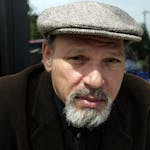The Golden Globes just threw a hand grenade into the Oscars battle.
By naming "1917" best drama Sunday, the Hollywood Foreign Press Association suddenly put the epic war picture on the front lines for Hollywood's most prestigious award, which might come a shocker to audiences since the film won't even be in wide release until Friday.
Sam Mendes, who was also selected as best director for "1917," seemed to take a dig at early favorites "The Irishman" and "Marriage Story," both of which were produced by Netflix and seen primarily on TV sets.
"I really hope this means people will turn up and see it on the big screen, the way it was intended," Mendes said in one of his acceptance speeches. He did, however, go out of his way to praise the man behind "Irishman," which failed to pick up a single award.
"There's not one director in the world who is not in the shadow of Martin Scorsese," he said.
The other big surprise of the evening was the victory for Awkwafina, of "The Farewell," who became the first woman of Asian decent to win for lead actress in a comedy or musical.
"I told you I'd get a job, dad," said Awkwafina, looking dazed from the moment her name was announced.
In other ways, the Globes confirmed some tried-and-true notions, like how playing musical icons can really pay off.
As expected, Renée Zellweger was named best dramatic actress for playing Minnesota native Judy Garland in "Judy," securing her place as the clear front-runner for the Oscar ceremonies next month. She nodded to the fact that she had been largely missing from the scene since her last Globe nomination for 2007's "Miss Potter," thanking voters for "inviting me back to the family reunion."
But Taron Egerton's win for playing Elton John in "Rocketman" was not as expected, especially considering the competition included Leonardo DiCaprio and Eddie Murphy. But Egerton didn't mention those big names during his acceptance speech. Instead he gave a shoutout to nominee Roman Griffin Davis, the 12-year-old star of "JoJo Rabbit."
DiCaprio's "Once Upon at Time ... In Hollywood" kept its position as an Oscar favorite with a win for best comedy or musical. Brad Pitt and director Quentin Tarantino were also winners.
"Marriage Story" supporting actress Laura Dern strengthened her Oscar chances with a victory, as did "Joker" star Joaquin Phoenix, who was named best actor, although his speech came across more like an apology for his boorish behavior than gratitude for the recognition. So much of his comments were bleeped that it was hard to tell.
Academy Award nominations will be announced Jan. 13, with ceremonies held Feb. 9.
Americans did just fine in the film categories, but when it came to TV, the voters seemed determined to remind viewers that they were members the Hollywood Foreign Press Association.
During the first half of the ceremony, Americans took a back seat time and time again, most notably to stars and creators from the United Kingdom.
As it was during the Emmys this past September, "Fleabag" was named best comedy with acting honors also going to its English star/creator Phoebe Waller-Bridge.
"I'd like to thank Obama for putting us on his list," said the multitalented star, referring to the past president's recent shout-out to the sinfully delightful sitcom about a woman who could just as well move into a confessional booth. "As some of you may know, he's always been on mine."
HBO's "Succession," which won for best drama, may be about an ultra-rich family in the United States, but it was created by the UK's Jesse Armstrong and stars fellow Englishman Brian Cox, who was named best actor. "Chernobyl," which was directed by Swede Johan Renck and starred an international cast, was named best miniseries or TV film.
Those wins were not big surprises. The same can't be said for Ramy Youssef, a second-generation Egyptian immigrant, who kicked off the evening by accepting the award for best comedic actor for his work in "Ramy," his sitcom about an immigrant determined to hold onto his Islamic faith, despite the fact that the show never got much of a publicity push from Hulu.
"I know you guys haven't seen my show," said Youssef in his speech, speculating that many in the star-studded audience may have mistaken him for an editor.
Other early TV winners included Brit Olivia Colman ("The Crown"), Sweden's Stellan Skarsgård ("Chernobyl") and Russell Crowe, who could not accept for his role as Roger Ailes in "The Loudest Voice" because he was home in Australia dealing with the current wildfires. His acceptance speech, read by Jennifer Aniston, urged viewers to treat the current crisis in his country as a wake-up call to the perils of climate change. Other celebrities, including Aussie Toni Collette, also made a point of recognizing the disaster overseas.
Other winners used their podium time to make even stronger political statements. Patricia Arquette, who won for "The Act," lambasted President Donald Trump's policy toward Iran. Michelle Williams, who repeated her recent Emmy success from her work in "Fosse/Verdon," implored women to assure they have abortion rights by participating in the election process.
"Whether you're 18 or 118, when it comes time to vote, do so in your best interest," she said "It's what men have been doing for years."
Ellen DeGeneres and Tom Hanks received lifetime achievement awards — and spent nearly half a lifetime thanking fans, which explains why the show ran a bit longer than usual. DeGeneres got a bit emotional talking about her roller-coaster career, but she didn't actually break down like Hanks did. The two-time Oscar winner blamed a nagging cold.
"I'm not nearly this emotional at home," he said.
Ricky Gervais, returning as host for the fifth time, seemed a bit more restrained this time around, although he managed to get off some zingers in his opening monologue, comparing Joe Pesci to Baby Yoda and ribbing Leonardo DiCaprio for dating younger women.



